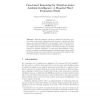Free Online Productivity Tools
i2Speak
i2Symbol
i2OCR
iTex2Img
iWeb2Print
iWeb2Shot
i2Type
iPdf2Split
iPdf2Merge
i2Bopomofo
i2Arabic
i2Style
i2Image
i2PDF
iLatex2Rtf
Sci2ools
125
click to vote
ICCBR
2009
Springer
2009
Springer
Case-Based Reasoning for Situation-Aware Ambient Intelligence: A Hospital Ward Evaluation Study
Abstract. Ambient intelligent systems are defined as being able to perceive their environment, being aware of the presence of people and other agents, and respond intelligently to these agents’ needs. Today the hardware requirements for achieving these capabilities are met. Earlier work have argued that knowledge intensive case-based reasoning is a feasible method for ambient intelligence. In this paper that argument is supported by testing of an implementation in a hospital ward domain, which shows that despite some issues related to the current implementation the case-based reasoner performs at an acceptable level.
Ambient Intelligent Systems | Artificial Intelligence | Case-based Reasoner Performs | ICCBR 2009 | Intensive Case-based Reasoning |
| Added | 26 May 2010 |
| Updated | 26 May 2010 |
| Type | Conference |
| Year | 2009 |
| Where | ICCBR |
| Authors | Anders Kofod-Petersen, Agnar Aamodt |
Comments (0)

